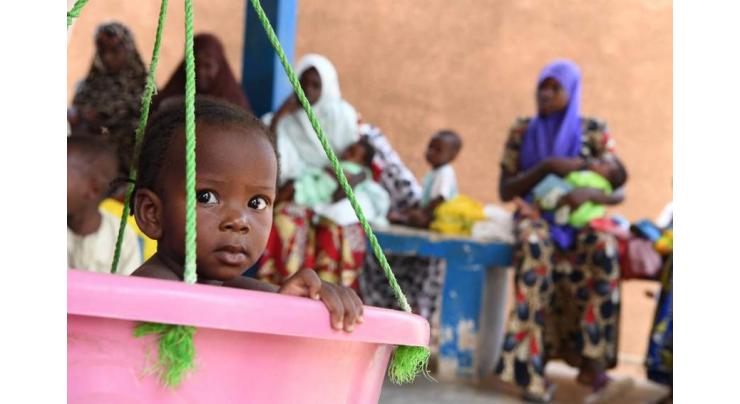
- Home
- World
- News
- Global Network Against Food Crises Urges Action to Prevent Dire Consequences of COVID-19
Global Network Against Food Crises Urges Action To Prevent Dire Consequences Of COVID-19
Umer Jamshaid Published April 21, 2020 | 03:01 PM

The COVID-19 pandemic is set to have devastating consequences for vulnerable people in food-crisis situations as it further hampers food availability and disrupts supply chains, therefore a global preemptive action is needed as soon as possible, the report, published by the Global Network against Food Crises on Tuesday, said
GENOA (UrduPoint News / Sputnik - 21st April, 2020) The COVID-19 pandemic is set to have devastating consequences for vulnerable people in food-crisis situations as it further hampers food availability and disrupts supply chains, therefore a global preemptive action is needed as soon as possible, the report, published by the Global Network against Food Crises on Tuesday, said.
"Given the unprecedented nature of the crisis, creating a better understanding of the potential impacts of COVID-19 and taking rapid collective action to pre-empt its impact on food security and food systems are of paramount importance and urgency. Anticipatory actions must be undertaken now to safeguard the livelihoods of the most vulnerable people and related agrifood systems to protect the critical food supply chain," the section of the report analyzing how the COVID-19 pandemic might contribute to the perpetuation or deterioration of food crises, reads.
According to the report, called Global Report on Food Crises (GRFC) 2020, there are 135 million acutely food-insecure people in 55 countries and territories, which is the highest number in the four years of the GRFC's existence. The data was collected throughout 2019.
The collective measures that the report cites as necessary are: to expand remote food security monitoring systems to provide up-to-date information on the impacts of the outbreak on food security and livelihoods; to preserve critical humanitarian food, livelihood and nutrition assistance to vulnerable groups; to position food in food-crisis countries to reinforce and scale up social protection systems, ensuring the most vulnerable can still access food; and to scale up support for food processing, transport and local food markets, as well as to advocate for trade corridors to remain open to ensure the continuous functioning of the critical food supply chain.
"While COVID-19 does not discriminate, the 55 countries and territories that are home to 135 million acutely food-insecure people in need of urgent humanitarian food and nutrition assistance are the most vulnerable to the consequences of this pandemic as they have very limited or no capacity to cope with either the health or socioeconomic aspects of the shock.
These countries may face an excruciating trade-off between saving lives or livelihoods or, in a worst-case scenario, saving people from the corona virus to have them die from hunger," the report said.
It added that people in food crises often have higher rates of underlying health conditions, including non-communicable diseases and malnutrition, which weaken the immune system and increase the risk of people developing severe COVID-19 symptoms.
The report said that harvests have been good and the 2020 outlook for crops is promising, but COVID-19 response measures and movement restrictions are likely to disrupt transportation of food and other critical goods, increasing delivery times and reducing their availability.
Pandemic consequences in terms of food security may be particularly grave on nomadic and semi-nomadic populations, the report said, if national governments close borders, disrupting livestock migration routes, including across the fragile Sahel region.
"Protectionism policies, such as tariffs and export bans, could also drive up food prices, while food crisis countries that rely heavily on food imports to cover consumption requirements, such as the Democratic Republic of the Congo, the Sudan, the Syrian Arab Republic and Yemen, will experience rising food prices if their currencies depreciate further relative to the US Dollar. If major importers resort to panic buying, the price of globally traded food commodities could increase, particularly in the short term," the report added.
The 15-member Global Network against Food Crises is an international alliance working to address the causes of extreme hunger. It was launched by the European Union, the Food and Agriculture Organization and the UN's World Food Programme in 2016.
Related Topics
Recent Stories

HEC reviews curricula for environmental sciences degree programme

ICC Asia looking forward to an action-packed Asia Cricket Week

Yuvraj Singh named ICC Men’s T20 World Cup 2024 Ambassador

Greece hands Olympic flame to 2024 Paris Games hosts

Two Kyiv hospitals evacuating over feared Russian strikes

World must act on neurotech revolution, say experts

Charles & Catherine's cancer diagnoses

Champions Alcaraz and Sabalenka through in Madrid Open

King Charles to resume some public duties during cancer treatment: palace

US defense chief announces $6 bn in security aid for Ukraine

Heavy rains cause damage to Spezand-Taftan railway track

Woman stabbed in Israel, attacker killed: police
More Stories From World
-
Tennis: ATP/WTA Madrid Open results - collated
16 minutes ago -
PGA Zurich Classic of New Orleans scores
16 minutes ago -
Sudanese filmmakers shine light on war's 'silent problems'
16 minutes ago -
NFL will allow players to wear Guardian Cap helmets in games
7 hours ago -
Football: German Bundesliga table
7 hours ago -
Football: Italian Serie A result
7 hours ago
-
Football: German Bundesliga results
7 hours ago -
US troops to leave Chad in second African state withdrawal
7 hours ago -
Plastics pollution may be solved without production cap: Canada minister
7 hours ago -
Biden stalls on menthol cigarette ban fearing Black vote backlash
7 hours ago -
Champions Alcaraz and Sabalenka through in Madrid Open
7 hours ago -
6,000 French police to welcome Olympic torch amid bonus boost
8 hours ago